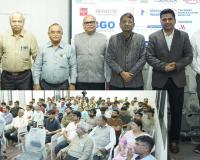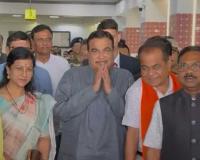Continuous Efforts by Chamber Result in Inclusion of Spinning Units in Gujarat's New Textile Policy 2024

Surat: Following continuous presentations by the Chamber of Commerce, spinning units that produce yarn from fiber have been included for the first time in Gujarat’s new Textile Policy 2024. The Chamber of Commerce has expressed gratitude to Chief Minister Bhupendra Patel, Industry Minister Balwant Rajput, and State Industry Minister Harsh Sanghavi for this inclusion.
On Tuesday, Gujarat Chief Minister Bhupendra Patel announced the Textile Policy 2024 in Gandhinagar. President of the Southern Gujarat Chamber of Commerce & Industry (SGCCI), Vijay Mewawala, expressed thanks to the Chief Minister for launching the much-awaited policy.
Chamber’s Consistent Efforts Rewarded
Mewawala noted that the Chamber of Commerce had been eagerly awaiting the policy and had made persistent efforts to ensure its introduction. The Chamber had requested capital subsidy advances to be a part of the new policy, especially since strict subsidies for textiles had been discontinued. In response, the Gujarat government has increased upfront capital subsidies from 10% to 35%, along with an interest subsidy of 5-7% for a period of five to eight years. Additionally, a power subsidy of ₹1 per unit has been announced, applicable even if power is procured through DISCOM or open access.
Textile units, especially those involved in weaving, knitting, and processing, established in Category 3 regions, will be eligible for capital subsidies of up to ₹40 crore. Similarly, units engaged in garmenting and technical textiles will receive up to ₹50 crore in subsidies. For units in Category 1 regions, the maximum capital subsidy will be ₹50 crore, while garmenting and technical textile sectors could benefit from subsidies as high as ₹100 crore.
Major Boost for PM MITRA Park
The PM MITRA Park, an industrial hub for the textile sector, has been awarded maximum benefits, akin to those provided to Category 1 units. The inclusion of spinning units that convert fiber into yarn in the policy comes after continuous requests from the Chamber of Commerce.
Impact on Surat's Textile Units
Mewawala added that, due to the absence of a textile policy, many textile units in Surat were shifting operations to Navapur, Maharashtra. With the announcement of this new policy, the exodus of Surat’s textile units is expected to slow down. The new policy provides substantial incentives, particularly capital and power subsidies, along with payroll-linked interest subsidies, which are welcomed by industry players. These initiatives will lead to large-scale growth in the garment sector, not only in Surat but across South Gujarat.
Nikhil Madrasi, Vice President of the Chamber, emphasized that the textile industry contributes significantly to the economic development and employment of South Gujarat. He predicted that the new policy would transform Surat, traditionally known as a hub for MMF (Man-Made Fiber) fabric, into a center for MMF garments as well. The policy covers all sectors of the textile industry and includes incentives for yarn manufacturing units using Polyester Staple Fiber and Viscose Staple Fiber.
Madrasi further noted that the previous 2019 textile policy did not cover spinning units. However, the Chamber had consistently demanded benefits for MMF spinning, and these demands have been acknowledged in the new policy, benefiting the textile industry in South Gujarat extensively.






